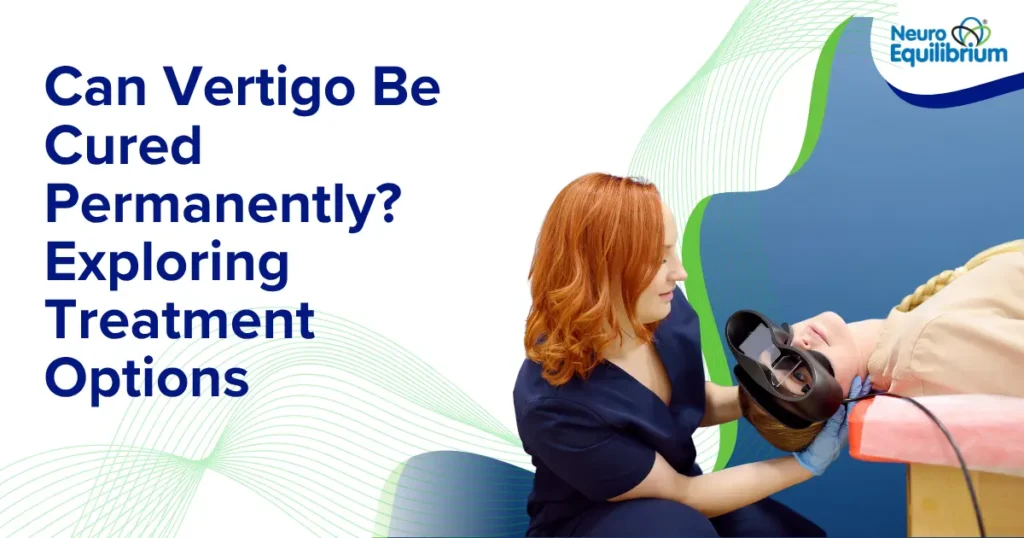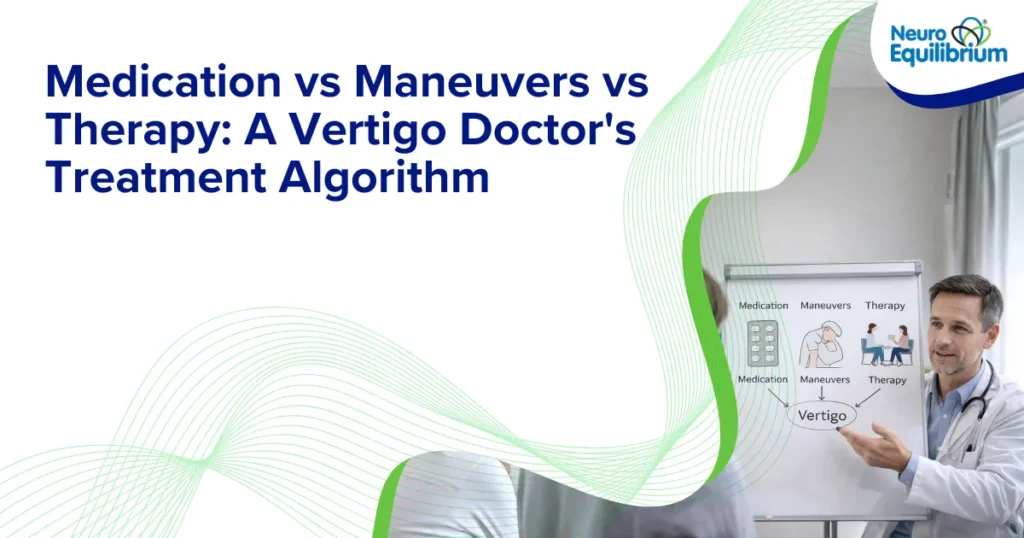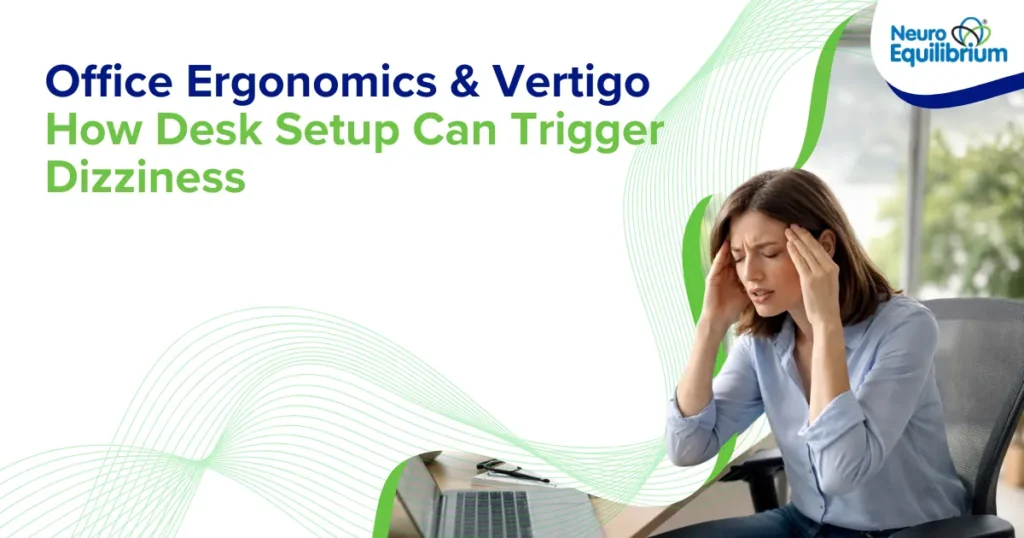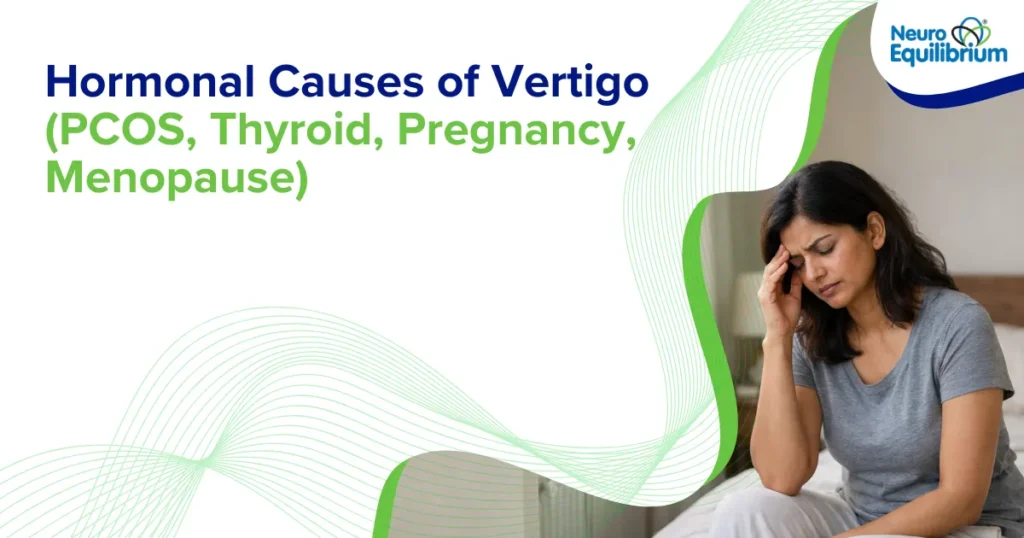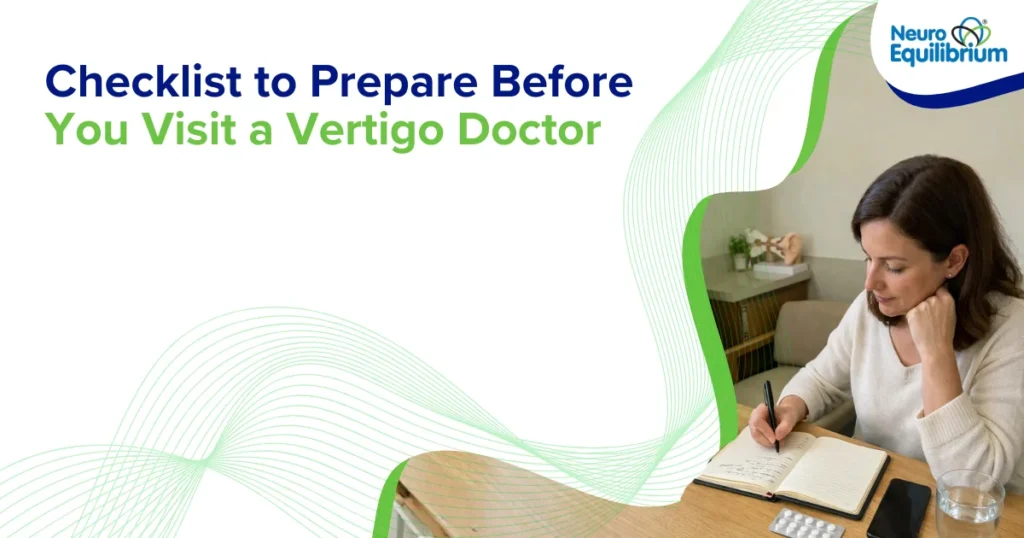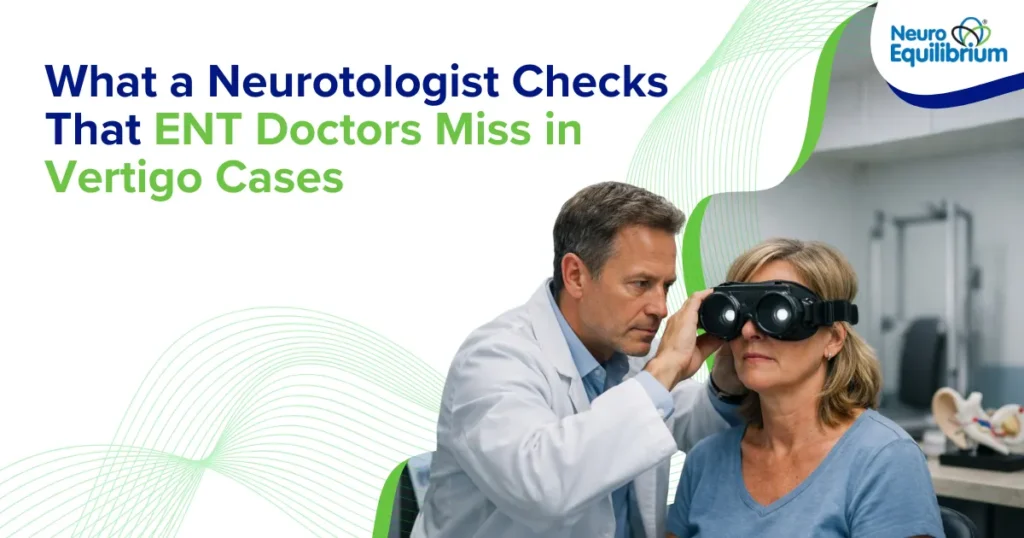Imagine getting out of bed or turning your head, and suddenly it feels like the room is spinning or like you’re standing in the middle of an earthquake. That is what vertigo, also called chakkar, feels like. It can be a really uncomfortable and even scary experience.
When someone feels dizzy all the time or gets dizzy often, it can make them lose confidence. They might become afraid of falling and start avoiding regular activities. Simple things like walking, reading, or even using a phone can become difficult. Some people also feel anxious or sad because of it, and they may begin to stay alone more often.
Many people who have vertigo ask themselves if it can be completely cured or if they just have to live with it. The answer depends on what is causing the vertigo. The good news is that with the right diagnosis and treatment plan, vertigo can often be managed or even go away..
Understanding the Root Causes of Vertigo
The most important thing to note is that vertigo is not a disease, it is a symptom. Dizziness and vertigo can be caused by about 40 significant conditions of the inner ear or the brain just as a fever could be a sign of any number of illnesses. The inner ear is a complex structure that accommodates fluid-filled canals as well as sensitive hair cells and is essential in balance. Vertigo may be the result of a disturbance of this complex balance system.
Know More About Vertigo
- What is Vertigo? Causes, Symptoms, & Treatment
- Beware of Falls: The Importance of Fall Prevention in Elderly
- Top 3 Essential Vertigo Tests: How to Identify and Manage Balance Disorders
Common causes of vertigo include:
- BPPV (Benign Paroxysmal Positional Vertigo): This is one of the most frequently occurring causes of vertigo in all age groups, but the prevalence of this cause grows with age. BPPV is a condition that is caused by the otoliths (calcium carbonate crystals) being dislodged out of their usual place in the utricle and into the fluid-filled semicircular canals in the inner ear. These displaced crystals are mechanically active, and as such, there are sudden, short-lasting episodes of spinning sensation that can last less than a minute, especially when the head is moving, such as when one gets out of bed, turns in bed, or bends down.
- Meniere’s Disease: This condition involves an increase in the pressure of the fluid within the inner ear, leading to recurrent episodes of vertigo, fluctuating hearing loss, tinnitus (ringing in the ears), and a sensation of fullness in the affected ear.
- Vestibular Migraine: Migraine in which dizziness or vertigo is the main symptom, but not a severe headache. The episodes may take seconds to hours or even days. Patients with vestibular migraine usually experience nausea, light-and-sound sensitivity (sensory amplification), as well as motion sickness. It may be present in children as young as 5 and adults up to 60, and may have a genetic basis.
- Vestibular Neuritis/Labyrinthitis: They are brought about by viral infections which cause inflammation of the balance nerve, and the audio-vestibular (audible and balance) nerve, respectively. Labyrinthitis is a medical emergency that might culminate in a serious spinning and nearly complete loss of hearing in one ear.
- PPPD (Persistent Postural-Perceptual Dizziness): Some individuals continue to experience dizziness even after the primary cause has been controlled. PPPD is a common chronic balance disorder characterised by persistent vestibular symptoms like postural instability or a rocking sensation, which worsen with upright posture, body movement, or busy visual environments.
Sometimes, vertigo can be linked to deeper health issues. These may include conditions related to the brain, such as stroke, multiple sclerosis, brain tumors, or acoustic neuromas. It can also be triggered by changes in blood pressure, anemia, uncontrolled diabetes, or even certain medications.
Because there are so many possible causes, it is not possible to say whether vertigo can be treated or resolved without first identifying the exact reason behind it. At NeuroEquilibrium, we understand this complexity. That’s why we follow a thorough, science-backed approach that is tailored to each individual. Our goal is to accurately find the root cause of the problem and build a personalized treatment plan to give every patient the best possible chance at recovery.
How Can Vertigo Be Treated?
Treatment of vertigo does not apply to all people. The proper treatment would be determined by the cause of it, the age of the person and how the body copes with balance. These are some of the common interventions that doctors incorporate to make people feel better:
1. Repositioning Exercises (for BPPV)
Sometimes, tiny crystals in your ear move to the wrong place and confuse your balance system. Special head and body movements can move these crystals back where they belong. It’s like a reset for your inner ear.
2. Medicines (Short-Term Use Only)
There are some medicines that may make you less dizzy in the short run but they should not be taken longer than some days. Why? It is the case because your brain will have to figure out once more how to balance itself and the medicine can slow down the process. The aim is to actually remedy the cause and not sweep away symptoms.
3. Balance Therapy (VRT)
This is like physical therapy for your balance system. You do exercises to help your brain get used to dizziness and learn to stay steady again. New cool tools like virtual reality and fun game-based apps make it easier and more interesting—like rehab turned into a challenge game!
4. Lifestyle Changes
Small changes in daily habits can make a big difference, especially for conditions like Meniere’s disease or vestibular migraine.
- Eating Right: Eating less salt helps stop fluid from building up in the ear. Drinking enough water and avoiding junk food or sugary snacks can also help you feel better.
- Avoiding Triggers: Some people get dizzy from certain foods like aged cheese, chocolate, or processed meats. Figuring out your food triggers and avoiding them can prevent symptoms.
- Less Caffeine & Alcohol: These can mess with your balance, especially if you’re prone to migraines.
- Keeping Stress in Check: Stress and anxiety can make vertigo worse. Activities like yoga, meditation, or even just deep breathing can help calm your system.
- Getting Good Sleep: If you’re not sleeping well, your brain may struggle to keep your balance. Sticking to a sleep routine helps a lot.
5. Migraine & Anxiety Support
If your vertigo is linked to migraines or anxiety, doctors may give you medicine to help prevent episodes. Talking to a counselor or doing Cognitive Behavioural Therapy (CBT) can also help you feel more in control. CBT teaches you how to change negative thoughts into positive ones—and that can actually reduce how dizzy you feel.
At NeuroEquilibrium, we understand that vertigo is different for everyone. That’s why we don’t believe in one-size-fits-all treatments. Our expert team finds out exactly what’s causing your vertigo and builds a plan just for you—whether that’s special exercises, therapy, or lifestyle changes. With the latest technology and personalized care, we’re here to help you feel steady, confident, and in control again.
Which Vertigo Conditions Can Be Cured Permanently?
The potential for a permanent cure for vertigo is highly dependent on the underlying diagnosis.
- BPPV:Yes, BPPV could be cured permanently on many occasions. As it is a mechanical disorder, it is managed by repositioning maneuver, which physically moves the crystals back to its original place in the utricle. Such maneuvers as Epleys, Semonts, Barbecue, Zuma, or Yacovino are determined by the dislodged crystals type and location. An accurately maneuvered one can bring instant removal of symptoms.
- Vestibular Neuritis: This condition, caused by inflammation of the balance nerve, often resolves with initial medical treatment (like high-dose steroids for labyrinthitis) followed by vestibular rehabilitation therapy. Early diagnosis and treatment are crucial, especially for labyrinthitis, to prevent permanent hearing loss.
- Meniere’s Disease, Vestibular Migraine, and PPPD: These conditions are typically managed long-term rather than permanently cured.
- Meniere’s Disease requires ongoing management focused on reducing inner ear fluid pressure through dietary restrictions (like salt restriction) and medical treatment.
- Vestibular Migraine is primarily influenced by lifestyle and dietary modifications, such as eating on time, reducing caffeine and alcohol, avoiding MSG, reducing screen time, managing stress, and ensuring adequate sleep. In some cases, “migraine prophylaxis” medications may be prescribed for several months to control symptoms.
- PPPD has shown remarkable functional recovery when the treatment plan includes Cognitive Behavioural Therapy (CBT). CBT helps patients understand and challenge negative thought patterns, develop coping strategies, and gradually re-engage in activities, thereby regaining confidence and control.
Here’s a comparison table:
| Condition | Can it be cured permanently? | Primary Management Approach |
| BPPV | Yes, often | Repositioning maneuvers (e.g., Epley’s, Semont’s, Zuma) to move dislodged crystals back to position |
| Vestibular Neuritis/Labyrinthitis | Often, with rehabilitation | Early medical treatment (e.g., high-dose steroids for labyrinthitis) followed by vestibular rehabilitation therapy |
| Meniere’s Disease | No, typically managed | Diet (salt restriction), medication to reduce inner ear fluid pressure |
| Vestibular Migraine | No, typically managed | Lifestyle and dietary modifications, migraine prophylaxis medication, stress management |
| PPPD | No, typically managed | Cognitive Behavioural Therapy (CBT) to address dysfunctional responses and regain confidence |
When to Seek Specialized Help
If you’ve been feeling dizzy a lot, are off-balance all the time, or have a mix of symptoms that just won’t go away, it’s time to see a vertigo specialist. These doctors focus only on problems with balance and dizziness, and they can figure out exactly what’s going on.
They’ll start with a full check-up, which includes asking about your health history, checking how your eyes move, testing your balance, and seeing how your brain is working. Then, they might use advanced tools and tests like:
- VNG – checks eye movements to see how your inner ear is working
- SVV – tests how your brain understands what “straight” looks like
- vHIT – sees how your head and eyes move together
- DVA – checks if your vision gets blurry when your head moves
- Posturography – tests how well your body keeps balance
- Audiometry (hearing tests) or brain scans (MRI/CT) – used to rule out serious things like tumors or strokes
At NeuroEquilibrium, we’re a network of specialised vertigo and balance clinics with over 200+ centers across India. Our team of doctors are experts in diagnosing and treating dizziness—even in cases where routine ENT check-ups don’t provide clear answers.
Conclusion: Can It Be Cured? Yes — With the Right Diagnosis
Yes, vertigo can be treated—and often cured—when you know what’s causing it. Some types of vertigo can go away quickly with simple treatments, while others may take a bit more time and care. The most important thing is to not ignore the problem.
Getting the right diagnosis from a specialist is key. Once you know what’s causing the dizziness, the right mix of treatment, exercises, and lifestyle changes can help you feel much better and get back to normal life.
If you or someone you know is dealing with dizziness, connect with the Neuroequilibrium clinic near you today.
Sources
- Swartz R. (2005). Treatment of Vertigo. American Family Physician. https://www.aafp.org/pubs/afp/issues/2005/0315/p1115.html (AAFP)
- Stanton M., et al. (2023). Vertigo in Clinical Practice: Evidence-Based Diagnosis and Management. NCBI Bookshelf. https://www.ncbi.nlm.nih.gov/books/NBK482356/ (NCBI)
- Therapeutic interventions in vertigo management. (2017). International Journal of Otorhinolaryngology & Head and Neck Surgery. https://www.ijorl.com/index.php/ijorl/article/download/418/291/2552 (ijorl.com)
- “Vertigo: Causes, Symptoms, Treatment, and More.” Healthline. https://www.healthline.com/health/vertigo (Healthline)
- “Vertigo: Drug Treatment and Management.” Medscape – Dizziness, Vertigo & Imbalance Treatment & Management. https://emedicine.medscape.com/article/2149881-treatment (Medscape eMedicine)
- “Vertigo — Symptoms, Causes & Treatments.” Healthdirect. https://www.healthdirect.gov.au/vertigo (Healthdirect)
- “Vertigo – Vertigo, Balance Disorders, ENT.” Medanta (Indian hospital). Vertigo: Symptoms, Causes, Risk, Prevention & Treatment. https://www.medanta.org/pillar/vertigo-symptoms-causes-risk-prevention-treatment (@Medanta)
FAQs
Can vertigo be cured permanently?
In some cases, vertigo can be cured permanently, but this also depends on the cause. Some of them, e.g., BPPV (Benign Paroxysmal Positional Vertigo), may be treated thoroughly by some maneuvers. Nevertheless, fainting may be caused by other conditions such as Meniere Disease, vestibular migraine, or PPPD, and such conditions can be managed by the right treatment.
Book a consultation at your nearest NeuroEquilibrium Clinic today.
What are the most common causes of vertigo?
Vertigo is mainly caused by BPPV, Meniere Disease, vestibular migraine, vestibular neuritis or labyrinthitis and Persistent Postural-Perceptual Dizziness (PPPD). Brain conditions, changes in blood pressure, anemia, uncontrolled diabetes, and some medicines are other potential causes.
Book a consultation at your nearest NeuroEquilibrium Clinic today.
How is vertigo diagnosed?
To identify the cause of vertigo, a specialist will usually conduct thorough medical history, physical examination (observing eye movements, balance, and neurological tests), and some special tests such as Videonystagmography (VNG), Video Head Impulse Test (vHIT), and in some cases MRI or CT scan.
Book a consultation at your nearest NeuroEquilibrium Clinic today.
How does vertigo get treated?
Therapy is based on the cause. There are repositioning maneuvers (in case of BPPV), medications (temporary), vestibular rehabilitation treatment, lifestyle and dietary adjustments, stress management and psychology, including Cognitive Behavioural Therapy. Certain chronic diseases necessitate long-term treatment.
Book a consultation at your nearest NeuroEquilibrium Clinic today.
When do I need a vertigo specialist?
It is worth going to a specialist in case you experience constant or severe vertigo, constant imbalance, or when your dizziness impairs your daily activities. It is desirable to diagnose early and correctly to achieve successful treatment and exclude serious underlying diseases.
Book a consultation at your nearest NeuroEquilibrium Clinic today.






